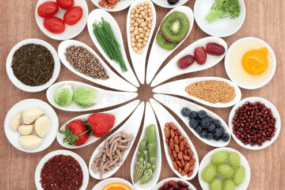
Introduction
Food is more than just fuel for our bodies; it is the foundation of health, well-being, and longevity. The connection between what we eat and our overall health is undeniable, as food directly impacts our physical, mental, and emotional well-being. In today’s fast-paced world, where convenience often trumps nutrition, it is more important than ever to understand how food influences our health and how making informed dietary choices can lead to a healthier and more fulfilling life.
The Science Behind Food and Health
Our bodies rely on essential nutrients from food to function optimally. These nutrients include macronutrients—carbohydrates, proteins, and fats—as well as micronutrients such as vitamins and minerals. Each of these plays a vital role in maintaining bodily functions, from providing energy to supporting immune health and repairing tissues.
- Carbohydrates: The body’s primary source of energy, carbohydrates are found in fruits, vegetables, whole grains, and legumes. Complex carbohydrates, such as those in whole foods, provide sustained energy and essential fiber, while refined carbohydrates and added sugars can lead to blood sugar spikes and long-term health issues.
- Proteins: Essential for muscle growth, immune function, and tissue repair, proteins are found in plant-based sources such as legumes, nuts, seeds, and tofu, as well as animal products.
- Fats: Healthy fats, such as those in avocados, nuts, seeds, and olive oil, support brain function, hormone production, and heart health. Trans fats and excessive saturated fats, found in processed foods, contribute to cardiovascular diseases.
- Vitamins and Minerals: These micronutrients play crucial roles in enzymatic reactions, immune function, and overall vitality. Eating a diverse, colorful diet ensures an adequate intake of these essential nutrients.
How Food Affects Your Body
1. Food and the Immune System
The immune system relies on proper nutrition to function effectively. Nutrients such as vitamin C, vitamin D, zinc, and antioxidants help strengthen immunity and protect against infections. A diet rich in fresh fruits, vegetables, nuts, and seeds provides these essential nutrients, while a diet high in processed foods and sugar can weaken immune function.
2. Food and Gut Health
The gut microbiome—comprising trillions of beneficial bacteria—plays a key role in digestion, immunity, and mental health. Consuming fiber-rich foods like whole grains, legumes, and fermented foods such as yogurt and kimchi promotes a healthy gut environment. In contrast, a diet high in processed foods, artificial sweeteners, and excessive antibiotics can disrupt gut balance, leading to digestive disorders and weakened immunity.
3. Food and Mental Health
There is a strong connection between diet and mental well-being. Nutrient-dense foods support brain function and neurotransmitter production, helping regulate mood and cognitive function. Omega-3 fatty acids, found in flaxseeds, walnuts, and chia seeds, are known to reduce inflammation and support brain health. On the other hand, diets high in processed foods, sugar, and unhealthy fats have been linked to an increased risk of depression and anxiety.
4. Food and Chronic Diseases
Poor dietary choices are a leading cause of chronic diseases such as heart disease, diabetes, and obesity. Diets high in processed foods, refined sugars, and unhealthy fats contribute to inflammation, insulin resistance, and cardiovascular issues. Conversely, a whole-food, plant-based diet can help prevent, manage, and even reverse some chronic conditions by reducing inflammation, stabilizing blood sugar levels, and improving overall metabolic health.
5. Food and Energy Levels
A balanced diet ensures sustained energy levels throughout the day. Whole grains, lean proteins, healthy fats, and fiber-rich foods provide steady energy, while high-sugar and processed foods cause rapid spikes and crashes in blood sugar levels, leading to fatigue and irritability.
The Role of Hydration in Health
Water is often overlooked but is essential for optimal health. Proper hydration aids digestion, nutrient absorption, detoxification, and temperature regulation. Drinking enough water, along with consuming hydrating foods like cucumbers, watermelon, and leafy greens, helps maintain overall well-being. Dehydration, on the other hand, can lead to headaches, fatigue, and poor cognitive function.
Adopting a Healthier Diet
Making healthier dietary choices does not have to be overwhelming. Small, sustainable changes can lead to significant long-term benefits. Here are some key strategies:
- Eat More Whole Foods: Focus on unprocessed, nutrient-dense foods such as fruits, vegetables, whole grains, nuts, seeds, and legumes.
- Limit Processed Foods: Reduce intake of foods high in added sugars, artificial ingredients, and unhealthy fats.
- Incorporate Plant-Based Meals: Plant-based diets are rich in antioxidants, fiber, and healthy fats, reducing the risk of chronic diseases.
- Practice Portion Control: Mindful eating and portion control help maintain a healthy weight and prevent overeating.
- Stay Hydrated: Drink plenty of water throughout the day and limit sugary beverages.
- Cook at Home: Preparing meals at home allows for better control over ingredients and nutritional content.
The Importance of a Balanced Diet
A well-balanced diet provides all essential nutrients in appropriate proportions. The key is variety—ensuring that meals include different food groups to meet daily nutritional needs. The Mediterranean diet, for example, is widely recognized for its health benefits due to its emphasis on whole foods, healthy fats, and lean proteins.
Conclusion
The connection between food and health is undeniable. What we eat directly influences our physical health, mental well-being, and overall quality of life. By making conscious dietary choices, we can nourish our bodies, prevent diseases, and improve longevity. A commitment to eating whole, nutrient-dense foods and staying hydrated can pave the way for a healthier, happier future. Prioritizing nutrition is not just about looking good—it is about feeling good and living life to its fullest potential.























